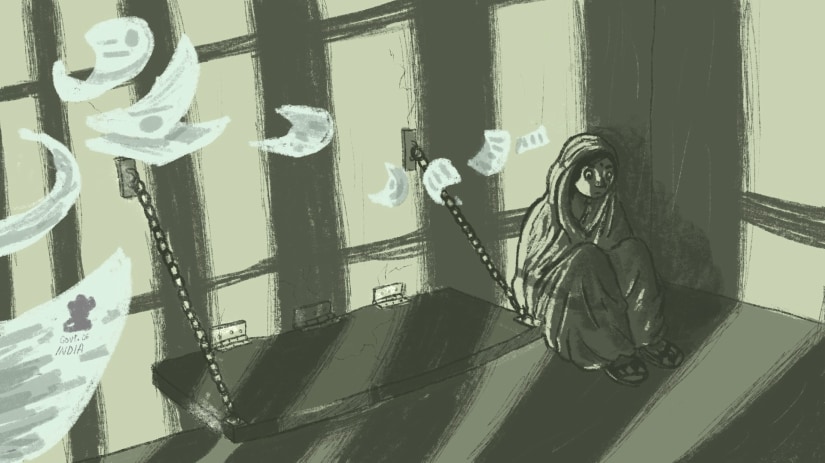In the year 2008, when Rimple Mehta was a 23-year-old student social worker, she met Amina at a prison for under-trials in Mumbai. A Bangladeshi immigrant in India, Amina was set to be deported back to her home. One of the many Bangladeshi women in prison at the time, her story struck Mehta as both brave and troubling. Brave because she had made it to mainland India, despite the many risks, and troubling because nearly half the prison at the time was filled with women like Amina, who had crossed the border into India. Mehta has since worked on the issue of illegal migrants, focusing especially on women, thereby gendering research that has otherwise either been male-specific or general. “This period was crucial in understanding not only the experiences of the Bangladeshi women prisoners, but also the areas in which the system needed to be strengthened to ensure justice is meted out to the prisoners. In the last decade, my understanding of the issue has been from the lens of both social work practice as well as feminism,” she says. [caption id=“attachment_6907631” align=“alignnone” width=“825”]  Illustration © Sharath Ravishankar for Firstpost[/caption] Mehta’s study, which was undertaken in Jadavpur University under the SYLFF doctoral program, has culminated in the book Women, Mobility and Incarceration (Routledge). “Since most of the migration that takes place across the Indo-Bangladesh border is undocumented, it is difficult to estimate the numbers who cross over. Moreover, estimates that exist often focus on trafficked women who are rescued. To some extent, the Indian citizen is complicit in keeping them invisible.
As long as they work in factories, construction sites and homes at really low wages, they are invisibilised by those who employ them.
Any show of resistance on their part for their working conditions makes them even more vulnerable to exploitation,” Mehta says. Bangladeshi migrants have become a political issue, in some sense even bait. Parties and politicians, Mehta says, have used them one way or the other, without according them the dignity of existence. “It is common knowledge that different political parties also use them as vote banks by providing them with identity cards. In this way they become a part of the social, economic and political life in India, but are invisibilised and marginalised,” she says. Of the invisibilised, women and children appear on a rung below the men. A large number of women who cross the border, Mehta’s research says, cross alone, often escaping harsh familial environments, or quite simply chasing the promise of a better life. “They are married as soon as they attain puberty. Almost all of them had worked as domestic workers from a very young age in exchange for two meals a day. Their decision to migrate or get smuggled into India was in the context of extreme forms of violence and deprivations,” Mehta says. But borders aren’t just physical. Here, they are both social and masculine in definition. Women not only escape the circle of their own deprivation but also aid others in this endeavour. “The idea of maan-shonmaan (honour) is closely tied to the maintenance of both social and political borders. The woman is seen as the protector of the honour of the family, as well as the nation-state. Her movement across social and political borders is perceived to be transgressive,” Mehta says. This escape, though, has its price as most women either end up being trafficked, exploited for manual labour or inevitably land in prison. Mehta has met countless women in jails from Kolkata to Mumbai. While their physical and mental constitution is put test every day, a significant chunk of them are determined to build a better future. “The challenge lies in representing these voices in a way that they generate empathy and garner action from civil society towards their issues. For the women I interacted with, the research process was meaningful to the extent that it added something new to their everyday prison routine. Contact with someone from the ‘outside’ world raised hopes of multiple kinds,” she says. But it’s not just Bangladeshi women who run the risk of being thrown into limbo in India’s jails. A number of Bengali women, Mehta says, have also ended up in prison for want of documents that have perished due to accidents. “The absence of documents makes one a ‘foreigner’. This has been evidenced adequately in the case of an ex-army man who was arrested in Assam, as his name did not feature in the National Registry for Citizens. “While not having documents is one part of the story, one also needs to account for the procedural lapses that may take place while dealing with a population this large,” she adds. Mehta believes the much debated NRC could significantly flood these prisons, and while that may be a part of the objective, handling such a large number of people with sensitivity and accuracy could eventually become impossible. Another point of concern is that often these Bangladeshi women languish in prisons past their declared sentences. They await paperwork, not decisive intervention or rescue. To add to that, India still handles migration through the colonial Foreigners Act (1946) that has been due for amendment for some time now. Statistics show that of the foreigners incarcerated in India, a majority come from countries India shares its border, and crucially, history with; history that still does not accommodate the voice of its women. “There is an urgent need to understand the processes through which Bangladeshi women are deported from different states in the country. The safety and security of the women must be ensured at the time of deportation,” Mehta says.


)

)
)
)
)
)
)
)
)



